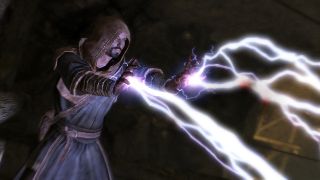Remember Skyrim’s radiant AI? It’s got the potential to revolutionise RPGs
Giving NPCs a mind of their own is a tricky feat to pull off - but it’s the final thing standing in the way of truly immersive RPGs
NPCs are a temperamental bunch. Sometimes they have enough depth to make you want to marry them on the spot - *cough* Nick Valentine *cough* - and other times it’s hard not to become irritated by that one line they repeat over and over (Skyrim’s merchants muttering ‘some call this junk… me, I call them treasures’ will forever be burned into my eardrums). When you get them right, though, NPCs are the difference between a game that feels like it’s populated by cardboard cut-outs and a living, breathing world. The only thing that makes this aspirational goal an actual possibility? Radiant AI. Or, more accurately, realising the true potential of Radiant AI.

Radiant AI isn’t some sort of glowing artificial intelligence. First introduced in Oblivion and then included in Skyrim too, this bit of technology has been described by Bethesda as a system that governs the behaviour of NPCs. Plenty of different mechanics work their way into radiant AI as a whole, among them functions like giving NPCs a routine so they’re not always standing in the same place from dawn until the dead of night. You’ll have undoubtedly noticed it - guards patrol the streets in every major city in both Oblivion and Skyrim; NPCs sit down and eat lunch; farmers work their fields during the day before popping back home for sleep. Join them in their daily routine and you’ll probably even notice them exchanging a few works with another character. We’ve long since gotten used to NPCs acting in that way, but small behaviours like that barely scratch the surface of what radiant AI is capable of.
When radiant AI goes wrong, it goes… right?
Oddly enough, it’s only when radiant AI goes wrong that you get to see just how powerful it is. After designing certain NPCs to have a raging addiction to skooma, Emil Pagliarulo, Oblivion’s game designer, remembers when “in one Dark Brotherhood quest, you can meet up with this shady merchant who sells skooma. During testing, the NPC would be dead when the player got to him. Why? NPCs from the local skooma den were trying to get their fix, didn't have any skooma, and were killing the merchant to get it!”.
Ultimately the radiant AI in Oblivion was toned down as a result as, by the sounds of it, cities turned into lawless lands where most NPCs’ main way of dealing with problems was to kill whoever was in their way and then loot their corpse. That might be normal behaviour for you or I, but it tends to cause issues when the blood of quest-givers are staining the cobblestones. Instead of focusing all its efforts on radiant AI in Skyrim, Bethesda created the radiant story system. Played all those Dark Brotherhood assassination contracts that never seem to end? Trawled through Vex’s limitless supply of thieving jobs? You have radiant story to thank for that.

Todd Howard admits that in a world like Skyrim, “we really have no control. It's a big playground, and for certain players it goes great but there's still a lot of players it goes poorly for. [Radiant story] allows us to control that some. Now we're at a good point where we know where we want to use it. We can use it for miscellaneous quests, you go into town, you want to make friends with somebody, we'll generate a little quest for him that seems simple and that it's ok to go through the radiant story system”. Those cookie-cutter missions are hard to escape in Guild questlines, where you have to save hostages for The Companions or fetch books for the College of Winterhold’s library. Radiant story produces those kinds of simple, repeated fetch quests, designed to ensure that you always have something to do and with enough variation - a different target to kill, or item to steal - to keep you from repeating exactly the same quest over and over.
The dream world
For obvious reasons Bethesda stopped short of using radiant story for major quests. Algorithms can’t come up with emotionally-fulfilling stories… yet. But when done right, radiant story and radiant AI should feed into each other in a self-fulfilling cycle. It’s partway there in Skyrim already: if you become friends with an NPC by doing a quest that mutually benefits them (like returning the Golden Claw to the Riverwood Trader), you’re allowed to take certain things from their house. Recent games like The Legend of Zelda: Breath of the Wild and Kingdom Come: Deliverance have started to set time limits for certain quests too. Miss out on meeting an NPC at the allotted time, and you’ll have to wait around until the next day. You can’t blame them, really. Who would react kindly to someone turning up at their house at 2.17am expecting to be given some odd jobs to do when you specifically told them to meet you in town at midday?


The best open world games of all time
Revolutionary radiant AI will only appear once NPCs are able to react to the world around them in a way that goes much deeper than simply noticing you’re especially proficient at lockpicking (or, as Skyrim’s town guards like to say, “keep your hands to yourself, sneak thief”). Imagine if merchants could keep tabs on the town’s dynamic economy as they do in Fable 2. One realises that giants’ toes are an especially rare commodity, so commissions you to fetch some. But flooding the market with them too rapidly makes them almost worthless. As a result, giants begin to take an especial dislike to you and hunt you down - or launch a siege on the town that’s begun to sell their little piggies at the market.
Sign up to the GamesRadar+ Newsletter
Weekly digests, tales from the communities you love, and more
Better radiant AI could eventually lead to a self-sustaining game world. Have a system where the game keeps track of characters’ relationships, and there’s the potential to issue radiant story quests to reflect how well everyone’s getting along. A regular at the local inn wants the bard to stop singing his dratted songs, so she asks you to steal his flute. Now the inn doesn’t have a bard, drinking numbers starts to stagnate. As people are drinking at home the innkeep lowers prices to get them back, which means more people drunkenly singing in the streets, and the town guard are under pressure to keep order intact… ok, so things might not get that intricate quite so fast. Yet that scenario feels awfully realistic, doesn’t it?
Reactive game worlds are incredibly dependent on radiant AI and its brother, radiant story. We take it for granted now, however bewildering it is when villagers are still gawping at a dead body that’s been lying by The Bannered Mare for three days and counting. But once it’s nailed, we could be faced with a game that needs relatively little upkeep and could continue providing us with fresh quests (almost) indefinitely. Perhaps a little too optimistic, I know. But with Elder Scrolls 6 on the horizon, radiant AI is hopefully one of the main things on Bethesda’s mind...
Got an urge to return to Skyrim after reading this? Here's 7 Skyrim hidden chest locations that’ll make you richer than Maven Black-Briar
While here at GamesRadar, Zoe was a features writer and video presenter for us. She's since flown the coop and gone on to work at Eurogamer where she's a video producer, and also runs her own Twitch and YouTube channels. She specialises in huge open-world games, true crime, and lore deep-dives.
Most Popular




